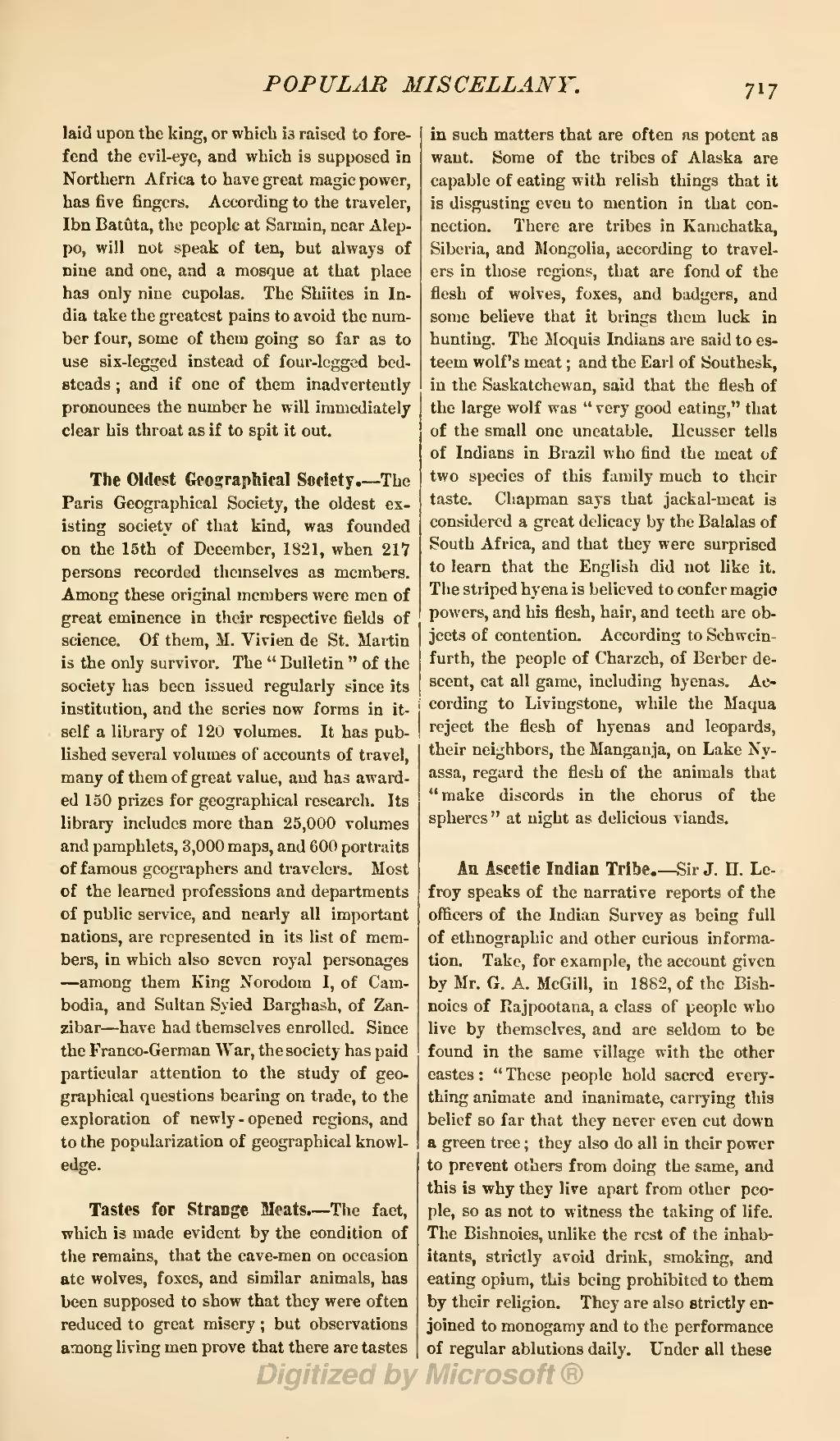laid upon the king, or which is raised to forefend the evil-eye, and which is supposed in Northern Africa to have great magic power, has five fingers. According to the traveler, Ibn Batûta, the people at Sarmin, near Aleppo, will not speak of ten, but always of nine and one, and a mosque at that place has only nine cupolas. The Shiites in India take the greatest pains to avoid the number four, some of them going so far as to use six-legged instead of four-legged bedsteads; and if one of them inadvertently pronounces the number he will immediately clear his throat as if to spit it out.
The Oldest Geographical Society.—The Paris Geographical Society, the oldest existing society of that kind, was founded on the 15th of December, 1821, when 217 persons recorded themselves as members. Among these original members were men of great eminence in their respective fields of science. Of them, M. Vivien de St. Martin is the only survivor. The "Bulletin" of the society has been issued regularly since its institution, and the series now forms in itself a library of 120 volumes. It has published several volumes of accounts of travel, many of them of great value, and has awarded 150 prizes for geographical research. Its library includes more than 25,000 volumes and pamphlets, 3,000 maps, and 600 portraits of famous geographers and travelers. Most of the learned professions and departments of public service, and nearly all important nations, are represented in its list of members, in which also seven royal personages—among them King Norodom I, of Cambodia, and Sultan Syied Barghash, of Zanzibar—have had themselves enrolled. Since the Franco-German War, the society has paid particular attention to the study of geographical questions bearing on trade, to the exploration of newly-opened regions, and to the popularization of geographical knowledge.
Tastes for Strange Meats.—The fact, which is made evident by the condition of the remains, that the cave-men on occasion ate wolves, foxes, and similar animals, has been supposed to show that they were often reduced to great misery; but observations among living men prove that there are tastes in such matters that are often as potent as want. Some of the tribes of Alaska are capable of eating with relish things that it is disgusting even to mention in that connection. There are tribes in Kamchatka, Siberia, and Mongolia, according to travelers in those regions, that are fond of the flesh of wolves, foxes, and badgers, and some believe that it brings them luck in hunting. The Moquis Indians are said to esteem wolf's meat; and the Earl of Southesk, in the Saskatchewan, said that the flesh of the large wolf was "very good eating," that of the small one uneatable. Heusser tells of Indians in Brazil who find the meat of two species of this family much to their taste. Chapman says that jackal-meat is considered a great delicacy by the Balalas of South Africa, and that they were surprised to learn that the English did not like it. The striped hyena is believed to confer magic powers, and his flesh, hair, and teeth are objects of contention. According to Schweinfurth, the people of Charzch, of Berber descent, eat all game, including hyenas. According to Livingstone, while the Maqua reject the flesh of hyenas and leopards, their neighbors, the Manganja, on Lake Nyassa, regard the flesh of the animals that "make discords in the chorus of the spheres" at night as delicious viands.
An Ascetic Indian Tribe.—Sir J. n. Lefroy speaks of the narrative reports of the officers of the Indian Survey as being full of ethnographic and other curious information. Take, for example, the account given by Mr. G. A. McGill, in 1882, of the Bishnoies of Rajpootana, a class of people who live by themselves, and are seldom to be found in the same village with the other castes: "These people hold sacred everything animate and inanimate, carrying this belief so far that they never even cut down a green tree; they also do all in their power to prevent others from doing the same, and this is why they live apart from other people, so as not to witness the taking of life. The Bishnoies, unlike the rest of the inhabitants, strictly avoid drink, smoking, and eating opium, this being prohibited to them by their religion. They are also strictly enjoined to monogamy and to the performance of regular ablutions daily. Under all these

